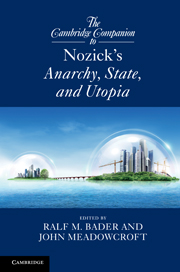Book contents
- Frontmatter
- Introduction
- Part I Morality
- Part II Anarchy
- Part III Justice
- 6 Nozick’s libertarian theory of justice
- 7 Nozick’s critique of Rawls: distribution, entitlement, and the assumptive world of A Theory of Justice
- 8 The right to distribute
- 9 Does Nozick have a theory of property rights?
- Part IV Utopia
- References
- Index
7 - Nozick’s critique of Rawls: distribution, entitlement, and the assumptive world of A Theory of Justice
from Part III - Justice
Published online by Cambridge University Press: 28 September 2011
- Frontmatter
- Introduction
- Part I Morality
- Part II Anarchy
- Part III Justice
- 6 Nozick’s libertarian theory of justice
- 7 Nozick’s critique of Rawls: distribution, entitlement, and the assumptive world of A Theory of Justice
- 8 The right to distribute
- 9 Does Nozick have a theory of property rights?
- Part IV Utopia
- References
- Index
Summary
A Theory of Justice is a powerful, deep, subtle, wide-ranging, systematic work in political and moral philosophy which has not seen its like since the writings of John Stuart Mill, if then. It is a fountain of illuminating ideas, integrated together into a lovely whole. Political philosophers must now either work within Rawls' theory or explain why not ... It is impossible to read Rawls' book without incorporating much, perhaps transmuted, into one' own deepened view. And it is impossible to finish his book without a new and inspiring vision of what a moral theory may attempt to do and unite; of how beautiful a whole theory can be.
(p. 183)Rawls’s construction is incapable of yielding an entitlement or historical conception of distributive justice … If historical- entitlement principles are fundamental, then Rawls’s construction will yield approximations of them at best; it will produce the wrong sorts of reasons for them, and its derived results sometimes will conflict with the precisely correct principles. The whole procedure of persons choosing principles in Rawls’s original position presupposes that no historical-entitlement conception of justice is correct.
(p/ 202)- Type
- Chapter
- Information
- The Cambridge Companion to Nozick's Anarchy, State, and Utopia , pp. 168 - 196Publisher: Cambridge University PressPrint publication year: 2011
- 3
- Cited by



